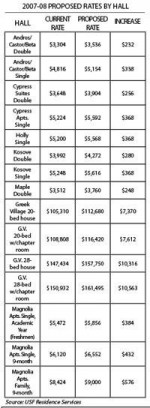USF proposes housing increase

Each year, residents of on-campus housing are faced with a housing rate increase regardless of whether they like it.
While the proposed 7 percent increase for 2007-08 is slightly higher than recent years, Director of Residence Services Tom Kane said the money – which will total approximately $1 million – will go toward a five-year plan full of new and innovative concepts.
According to a memorandum from Kane, the 7 percent would be divided four ways.
The most noticeable change stemming from the rate increase might be what Kane called an “academic initiative program” that would be available for students living on campus.
“We are beginning some pilot programs with a couple different colleges,” Kane said. “We’re going to hire some students to work as tutors and put, say, 30 students on one floor and use these students to help mentor these other students to get through (their classes). The upper-class students will live with the freshmen.”
Kane said that Resident Services also plans to upgrade some of its multi-purpose rooms and turn them into classrooms to provide residents the opportunity to take classes in their building.
Resident Services also plans to work with the College of Arts and Sciences to bring professors into the halls full time.
“We’re providing an apartment for the College of Arts and Sciences, and they will provide a faculty member to live there, and they’ll teach their classes in our residence halls – in some of those multi-purpose rooms,” Kane said. “(The idea is) that the student will actually have the opportunity to interact in the dining hall and in their living area with a faculty member, as opposed to just going to class with them.”
Kane said that although these ideas have been set in motion, it could take up to five years before they are all fully functioning. In the meantime, Resident Services has appointed a Living/Learning Center task force comprised of administrators, faculty and students to do research on other colleges around the country employing these concepts.
Although the initiatives may seem prodigious, Kane said that of the 7 percent increase, nearly half will be put toward students’ cost of living, and a smaller portion toward the academic initiative program.
“Our largest single expense is our bond debt – we have to make a mortgage payment every year for all the renovations we’ve done,” Kane said. “But that’s a fairly standard flat rate. Our two other areas that are impacted by cost of living, one being salaries … the other cost that we have to deal with is utilities – cost of oil, cost of gas. We use a lot of electricity and a lot of heat and air conditioning in our buildings. So when the cost of that goes up, that charge has to be passed on to the students.”
Another percentage of the increase would go into the Magnolia II project. The second group of apartment-style residence halls is scheduled to open in August 2009 and contain 1,000 beds. The total cost is estimated at $68 million.
The last portion of the increase will be used for the creation of an annual room-painting program. Kane said the extra money would allow for each resident’s room to be painted every three to five years.
“What we’re trying to do now is build some money into our budget, (so) that each year, we can go in and hit a small building or two small buildings or one hall and get that whole building painted to the point that in the next few years, we can get a cycle down so that every five years, every building would be painted,” Kane said.
Kane said the increase would affect every hall, including Greek Village. He also said that even though the increase is proposed at 7 percent, the final decision is up to the University Board of Trustees, which can move that figure either up or down.
“The increase is higher than I wanted, but considering the cost of the Magnolia project and a couple other things we’ve got to get done, that’s how high it just went this time,” Kane said.
According to Kane, approximately 40 percent of students return to the residence halls for a second year. However, with the increase proposal on the table, many students might look for other housing options off campus.
Anna Peters, a sophomore living in Castor Hall, said the increase will leave her with fewer housing options.
“I’m talking with my parents because it’s going to be so much to live on campus now,” Peters said. “I’m planning on maybe going off campus if possible. … It’s too expensive. I wanted to get a single room next year, but all the single rooms places on campus are crazy. … In what you get compared to apartments off campus, (the price is) not that great.”
Although Peters said she wasn’t told about the increase, she expected it to happen. Other students, however, may have only heard about it through their organizations.
“It’s just because I am part of (the Student Government) senate that I know about (the increase),” Magnolia resident Matt Coppens said. “I have been talking to many of the residents around here about the proposed increase. (I’ve been hearing) everything from, ‘Oh my God, they can’t do that,’ to ‘Why are they doing that?’ and just really befuddled looks.”
Kane said residence hall assistants have already been notified of the proposed increase, and it is up to their discretion to notify their residents.







